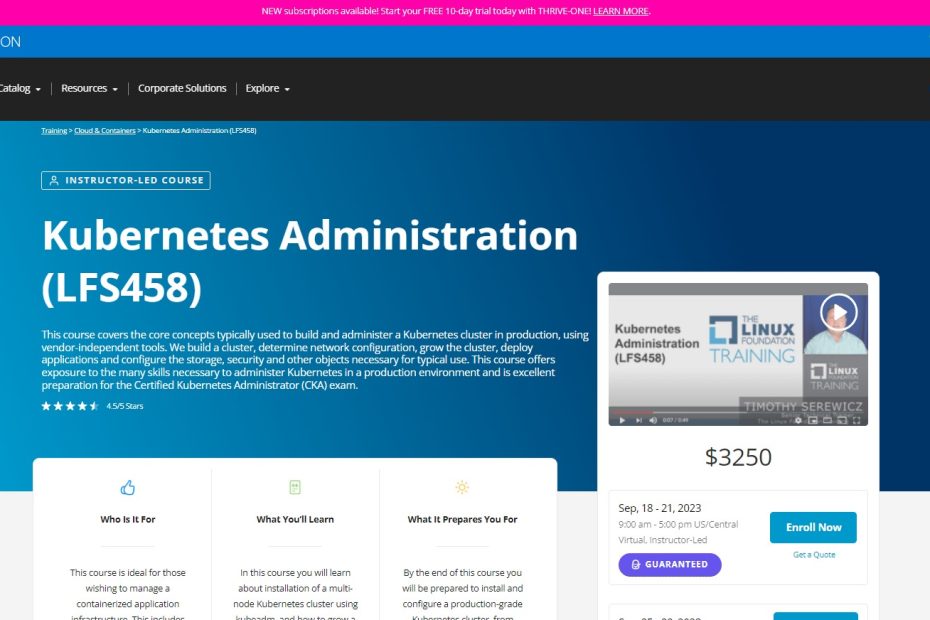In the rapidly evolving world of Information Technology, Kubernetes has emerged as a game-changing technology. As an open-source platform, Kubernetes automates the deployment, scaling, and management of containerized applications, making it a crucial tool for businesses aiming to streamline their operations and enhance efficiency.
The Linux Foundation, a non-profit technology consortium, plays a pivotal role in fostering the growth of open-source technologies like Kubernetes. Through its comprehensive training programs, the Linux Foundation equips IT professionals with the skills they need to navigate the dynamic landscape of modern technology.
Course Overview
The Kubernetes Administration (LFS458) course, offered by the Linux Foundation, is designed to provide a deep dive into the core concepts used to build and administer a Kubernetes cluster in a production environment. The course covers a wide range of topics, from building a cluster and determining network configuration to deploying applications and configuring storage, security, and other necessary objects.
The course has received a rating of 4.5 out of 5 stars, reflecting its high quality and the value it provides to its participants. By the end of the course, participants will be well-prepared to administer Kubernetes in a production environment, making it an excellent preparation for the Certified Kubernetes Administrator (CKA) exam.
Who Should Attend?
This course is ideally suited for IT administrators looking to manage a containerized application infrastructure. It’s also a great starting point for those embarking on a cloud career. The course provides a solid foundation in Kubernetes administration, making it a valuable resource for anyone wishing to enhance their IT skills and stay competitive in the job market.
By attending this course, participants can expect to gain a thorough understanding of Kubernetes, along with practical skills that can be immediately applied in a professional setting. This makes the Kubernetes Administration course a valuable investment for both existing IT professionals and those looking to break into the field.
Course Content
The Kubernetes Administration course offers a comprehensive curriculum designed to equip participants with a deep understanding of Kubernetes. The course content is divided into several key areas:
Basics of Kubernetes
Participants will be introduced to the fundamental concepts of Kubernetes, including its structure, adoption, and governance under the Cloud Native Computing Foundation (CNCF).
Installation and Configuration
This section covers the initial setup of a Kubernetes cluster using tools like Minikube and kubeadm, along with other installation tools.
Kubernetes Architecture
Participants will delve into the architecture of Kubernetes, exploring its networking capabilities and other cluster systems.
APIs and Access
This module focuses on API access, annotations, working with a simple Pod, and understanding kubectl and API. It also introduces Swagger and OpenAPI.
Managing State With Deployments
Participants will learn about managing deployment states, deployments and replica sets, DaemonSets, and the use of labels.
Learning Outcomes
By the end of the Kubernetes Administration course, participants will have gained a thorough understanding of how to install and configure a production-grade Kubernetes cluster. They will be equipped with the skills to handle tasks such as network configuration, upgrades, and making deployments available via services.
Additionally, the course serves as excellent preparation for the Certified Kubernetes Administrator (CKA) certification exam, providing participants with the knowledge and confidence to achieve this industry-recognized certification.
Certification
The Certified Kubernetes Administrator (CKA) exam is a crucial certification for IT professionals working with Kubernetes. The Kubernetes Administration course is designed to prepare participants for this exam, equipping them with the knowledge and skills they need to succeed.
Upon successful completion of the CKA exam, participants will be recognized as certified professionals in the field of Kubernetes administration, enhancing their credibility and marketability in the IT industry.
Course Reviews
The Kubernetes Administration course has received glowing reviews from participants, reflecting its high quality and effectiveness. Here are a few highlights:
“Good structure and background on content. Additional tools and industry examples were very helpful.”
“Exercises are great, but it took me a while to work on them, as it’s not something I use every day in my work.”
“The instructor was very knowledgeable and helpful, he took time to address everyone’s questions in a timely manner.”
These reviews underscore the course’s comprehensive content, practical exercises, and the expertise of the instructors, all of which contribute to a valuable learning experience.
Course Logistics
The Kubernetes Administration course is a 4-day, instructor-led program that can be attended virtually. The course is priced at $3250, and includes hands-on labs and assignments, course manual, 12 months of access to the online course, free registration for the CKA exam, a certificate of completion, and a digital badge.
The course is offered on multiple dates throughout the year, providing flexibility for participants to choose a schedule that suits them best.
Conclusion
The Kubernetes Administration course offered by the Linux Foundation is a comprehensive program that equips IT professionals with the skills they need to effectively administer a Kubernetes cluster in a production environment. With its in-depth content, practical exercises, and preparation for the CKA exam, this course is a valuable investment for anyone looking to advance their career in the field of IT.
Next Steps
If you’re ready to take your IT skills to the next level, consider enrolling in the Kubernetes Administration course. For more information, visit the Linux Foundation’s website or contact their team directly. Don’t miss this opportunity to enhance your knowledge, gain practical skills, and earn a recognized certification in Kubernetes administration.

